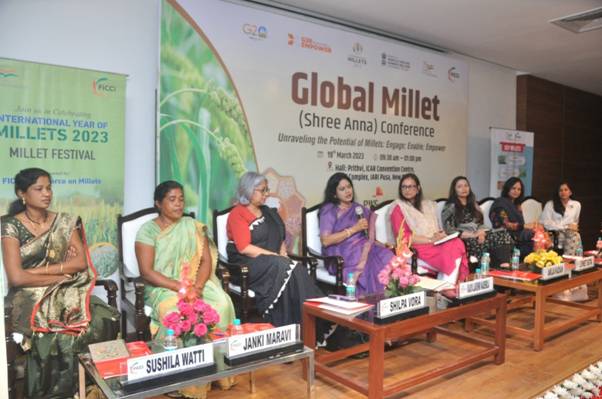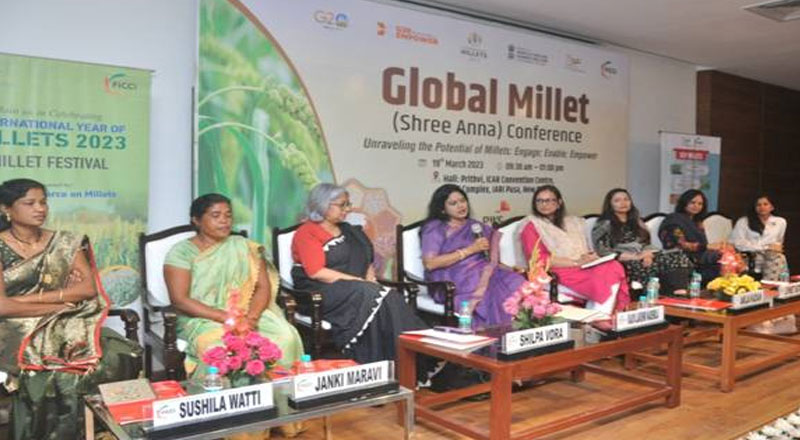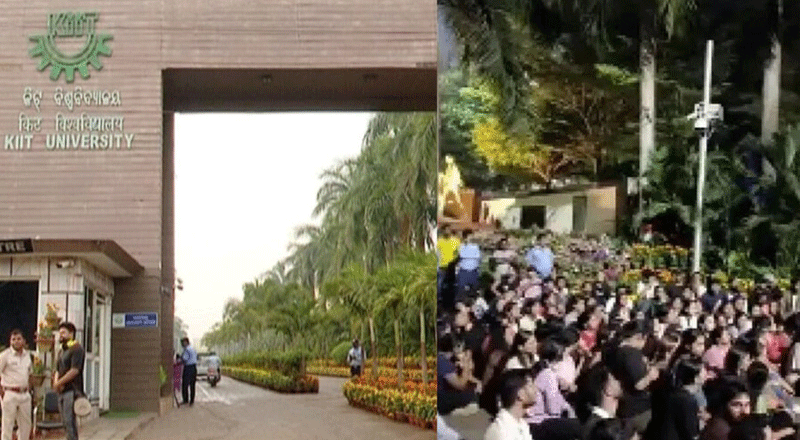Improved varieties, better shelf life, efficient processing and access to markets are all vital to strengthen the millet value chain, a senior Agriculture Ministry official has said.
“We must carry out R&D in all areas of the value chain of millets and bring together the knowledge of production, processing and storage and make it available to the consumer”, said Dr Vijaya Lakshmi Nadendla, Joint Secretary, Ministry of Agriculture and Farmers Welfare, addressing the Plenary Session on ‘Strengthening Millet Value Chain with Collaborative Approach’, organised by FICCI at the Global Millets ( Shree Anna) Conference, today.

On the occasion, Mr Jitendra Joshi, Chairman, FICCI Task Force on Millets & Director Seeds, South Asia from Corteva Agriscience, said, “Millets are nutritionally rich, easy to cultivate and sustainable farmer-friendly crop with no environmental impact. As the PM perfectly narrated that millets are a solution for personal health and global health.” “Let’s take our millets to the global map,” he added.
Mr Manoj Juneja, Deputy Executive Director and CFO, World Food Programme (WFP), underlined that millet is crucial for food and nutritional security, promoting biodiversity and empowering farmers. “It’s high time we revive the brand of millets and foster resilient food systems”, he said. Mr Sivakumar S, Group Head – Agri & IT Businesses, ITC Limited, emphasised synchronisation of the millets value chain as a critical requirement for scaling millets. In this regard, “Millets stakeholder partnerships are vital to creating such synchronisation”, he said.
Chef Harpal Singh Sokhi said, “Millets are the Pearls of India; I think the International Year of the Millets (Shree Anna) 2023 campaign is a great step towards making a sustainable Indian product as a lifestyle product on a global platform.” Besides, Mr Pankaj Agarwal, Founder and MD, Just Organik, called for “collaborative participation from all the stakeholders, starting from seed companies to farmers and chefs to markets and finally the consumers themselves”.
Ms Vishalakshi Vuyyala, Director, Minkan Agro Industries, said that the revival of millet food and crop cultures within the farming communities is of utmost importance to achieve the International Year of Millets campaign objectives and make it more sustainable.
Speaking at a separate session on “Opportunity for Women empowerment to create Millet success story”, Dr Nadendla averred that women’s contribution is immense in agriculture, irrespective of traditional, horticultural or any other crop. She added that as the government is propagating millets cultivation and increasing demand, it is expected that more women will get engaged in the cultivation of millets, thereby leading to a need for skilling and capacity building.
Dr Nadendla alluded to the International Year of Millets campaign and said, “I’m very much hopeful that the demand will increase, and the markets will grow. There is also a huge export potential”. She also spoke on the 10,000 Farmers Producer Organisations (FPO) program of the government, stating the government is “exclusively promoting 100% Women FPOs” and issued a guideline for the inclusion of “one woman on the Board of Directors of each FPO”. She also spoke on the dedicated FPO programme in the Ministry of Agriculture with “various measures for women empowerment.”
During the session, Dr Shilpa Vora, Chief Research & Development Officer, Marico, noted that millets are one of the ways to ensure nutritional security, adding, “it is not a new grain; however, ensuring sustainable quality and availability is needed”. Further, she underlined that millet, traditional nutricereals, need continuous investment into the entire supply chain, creating value-added products and sensitizing nutritional awareness.
Ms Akshi Jindal, CEO, Barmalt Malting India, highlighted that millets are easy to work with and offer endless possibilities. Ms Lovneet Batra, Nutritionist – Millets, added that “our traditional staple can be the food for the future, a sustainable solution for the double burden of malnutrition and obesity simultaneously”. She said that millets are essential for all life stages— from infant to young and old; however, awareness is an issue. Ms Ruchika Bhuwalka, Founder of Milletamma, also alluded to the need for broad basing awareness, stating, “we started WhatsApp groups and YouTube videos and visited farmers’ markets to tackle that”.
On occasion, Ms Sushila Watti, Board Member, Narmada FPC Mandla, Madhya Pradesh, said that their farmer producer company is set to establish its first millet processing plant. She added that they also run an awareness campaign in their region about cultivating the millet – Kodokutki. Ms Janki Maravi, President & Founding member, Halchalit Mahila Kisan Women producer Company, Samnapur, Dindori, said their all-women producer company had 1,200 shareholders and recorded sales of 75 tonnes of Kodokutki in 2022.





